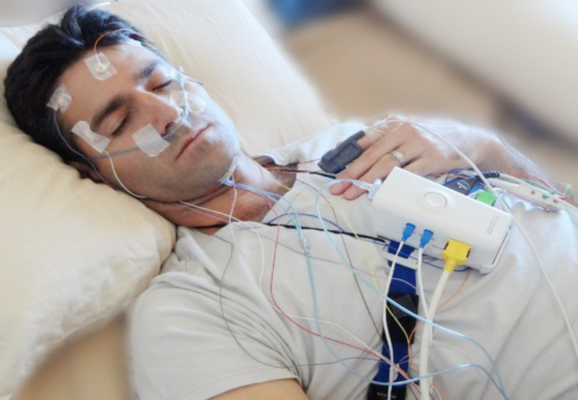No products in the cart.
Who requires sleep study?
Sleep disorders are very common and are often taken lightly. Getting a sound sleep is an extremely important part of a healthy lifestyle and hindrances in that area such as loud snoring, mouth breathing, insomnia, day-time sleepless etc, is a cause of concern and can be pointing towards a severe health issue. There are various types of sleep disorders such as sleep apnea, restless leg syndrome, narcolepsy, periodic limb movement disorder, insomnia and nighttime behaviors like sleepwalking and REM sleep behavior disorder. There disorders can have varying symptoms but a sleep study is the common test that can diagnose these disorders in the first place.
Why chose sleep study at home with Respikart?
Sleep studies can be carried out in a sleep clinic or at home. The biggest advantage of a home sleep study is that the patient stays in the familiar environment of home which assists in better sleep. The sleep study process itself can be a bit bothersome for the patient so having to sleep in a sleep clinic can drastically alter the patient’s sleeping pattern. At Respikart, we have highly trained sleep technicians with over 8 years of experience to conduct hassle-free sleep study at the comfort of your home. Sleep studied at a sleep clinic also tend to be costlier as you end up paying for the room whereas we at Respikart arrange sleep study at home at a minimal cost ranging from INR 8000- 10,000, depending on whether its level 1 or level 3 sleep study.
How do I book for a sleep study?
For a hassle free experience of sleep study at home, please call us on 9810089303 or email your referral to us at contact@respikart.com and one of our customer care executives will contact you the same day to book your sleep study at home.
What is the procedure for a sleep study?
A sleep study is carried out by a sleep technician. It is an overnight exam which consists of two phases – diagnostic and titration.
In the first phase, the sleep technician, will place sensors of electrodes on your head and body so as to be able to monitor a total of 21 channels. A computer is connected to the sensors by wires. However, this does not hinder the patient’s movement while sleeping as the wires are long enough to support movement while sleeping. A small clip also is placed on your ear and your finger to monitor the level of oxygen in your blood. While you sleep, with the help of the monitor, the sleep technician analyses your brain waves , breathing pattern, eye movements, heart rate, blood oxygen level, body position, chest and abdominal movement, Limb movement, snoring and other noise you may make as you sleep.
If at any point to want to get up and use the washroom, the technician can assist you with that.
In the second phase of the sleep study called the titration, the technician will make you wear a mask connected to a CPAP machine and adjust the pressure up and down during sleep to find a single best pressure delivery and setting to control apnea events.
Based on the sleep study report, the doctor can recommend a CPAP or Bi-PAP machine.
How to prepare for the sleep study?
On the day preceding the sleep study, the patient must avoid drinks or food containing alcohol or caffeine. Alcohol and caffeine can change your sleep patterns, and they may make symptoms of some sleep disorders worse.
It is also advisable not to nap in the afternoon before a sleep study so that the patient can sufficiently sleep at night. Taking a bath or shower before your sleep study will helps as any amount of oil in your hair might interact with the electrodes that will be connected to your head during the sleep sturdy.


